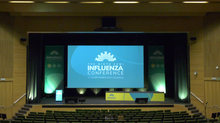Science based preparedness for and management of epidemic and pandemics
Saeed Ahmad
Preparedness and resilience for emerging threats: development of operational tools and networks for national pandemic preparedness for respiratory pathogens
Isabel Bergeri, World Health Organisation, Switzerland
Preparedness and resilience for emerging threats (PRET) is the WHO’s new approach to improve pandemic preparedness. There is a need to roll out this initiative to build capacity, knowledge, and tools. PRET can be leveraged and applied for groups of pathogens based on their mode of transmission (respiratory, vector-borne, foodborne etc.). PRET incorporates the latest tools and approaches for shared learning and collective action established during the COVID-19 pandemic and other recent public health emergencies. It will follow the principles of equity, inclusivity, and coherence at the forefront. PRET can provide a platform for national, regional and global stakeholders to collaborate and thereby strengthen preparedness. Data shows that countries with preexisting lab-based surveillance were significantly faster in establishing COVID-19 testing capacities, therefore we need to leverage on what already exists and focus on what is used to this day. In the future, countries need to improve both hazard core capacities and hazard focus systems and to implement PRET.
Modelling the public health and economic benefits of early versus late vaccination in a pandemic situation in the US: the influenza case study
Van Hung Nguyen, VHN consulting, Canada
Data have shown that a fast vaccination response during a pandemic helps to reduce mortality. Vaccinations campaigns that were started 3 months after the pandemic declaration decreased mortality significantly in all age groups. Early vaccination can thus significantly reduce the negative outcomes of the pandemic compared with late vaccination. Early vaccination would result in better QALY than late vaccination. Furthermore, healthcare costs are greater when vaccination starts at 6 months vs 3 months across all Vaccine Effectiveness evaluated. Preparedness strategies should focus on rapid vaccine roll out in the event of the next pandemic.
WHO’s Unity Studies: a global preparedness and readiness framework of investigations and studies of emerging respiratory pathogens of pandemic potential to inform evidence-based action
Nicki Boddington, World Health Organization, Switzerland
The Investigations & Studies Global Initiative, also known as the Unity Studies, provides a pandemic preparedness and readiness framework for conducting targeted investigations and studies that are critical for the risk assessment of any emerging or re-emerging respiratory pathogens of pandemic and epidemic potential. The overarching aim is to ensure an effective response for rapid evaluation of emerging respiratory pathogens, by providing critical tools to supplement routine surveillance to address urgent questions, particularly in the early stages of a pandemic.
Establishing thresholds for the severity of influenza epidemics in Hong Kong
Jessica Yuen-ting Wong, The University of Hong Kong, Hong Kong
Assessing the severity of influenza pandemics are a key factor in understanding the impact of COVID-19 and other respiratory viruses. Development of self-amplifying m.R.N.A based H2N3 pandemic vaccine that is cross reactive with improved safety features is an innovative way of respiratory illness understanding for applied research and science.
